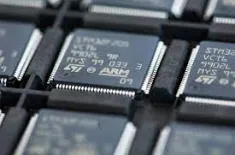IBM Research has unveiled a groundbreaking analog AI chip that demonstrates remarkable efficiency and accuracy in performing complex computations for deep neural networks (DNNs).
IBM Research has revealed a groundbreaking analogue AI chip showcasing exceptional efficiency and precision in handling intricate computations for deep neural networks (DNNs).
This breakthrough, detailed in a recent publication in Nature Electronics, represents a significant leap towards achieving high-performance AI computing while significantly conserving energy.
The conventional method of running deep neural networks on standard digital computing structures presents constraints in terms of performance and energy conservation. These digital systems involve continual data transfers between memory and processing units, causing computational slowdowns and reduced energy efficiency.
To address these hurdles, IBM Research has utilised the principles of analogue AI, mimicking the operations of neural networks in biological brains. This approach involves storing synaptic weights using nanoscale resistive memory devices, specifically Phase-change memory (PCM).
PCM devices modify their conductance through electrical pulses, enabling a spectrum of values for synaptic weights. This analogue technique reduces the necessity for excessive data transfer, as computations occur directly within the memory, resulting in heightened efficiency.
The newly introduced chip represents a cutting-edge analogue AI solution comprising 64 analogue in-memory compute cores.
Each core incorporates a crossbar array of synaptic unit cells alongside compact analogue-to-digital converters, seamlessly transitioning between analogue and digital domains. Moreover, digital processing units within each core manage nonlinear neuronal activation functions and scaling operations. The chip also features a global digital processing unit and digital communication pathways for connectivity.
The research team demonstrated the chip’s capabilities by achieving an accuracy of 92.81 percent on the CIFAR-10 image dataset—an unparalleled level of precision for analogue AI chips.
The throughput per area, measured in Giga-operations per second (GOPS) per unit area, highlights its superior computational efficiency compared to earlier in-memory computing chips. The innovative chip’s energy-efficient design, coupled with its enhanced performance, marks a significant milestone in AI hardware development.
The distinctive architecture and impressive capabilities of the analogue AI chip set the stage for a future where energy-efficient AI computing is accessible across a wide array of applications.
IBM Research’s breakthrough signifies a pivotal moment poised to drive advancements in AI-driven technologies for years to come.




































